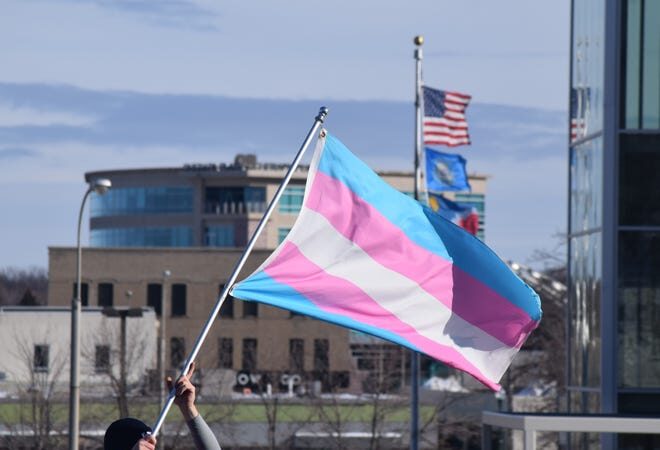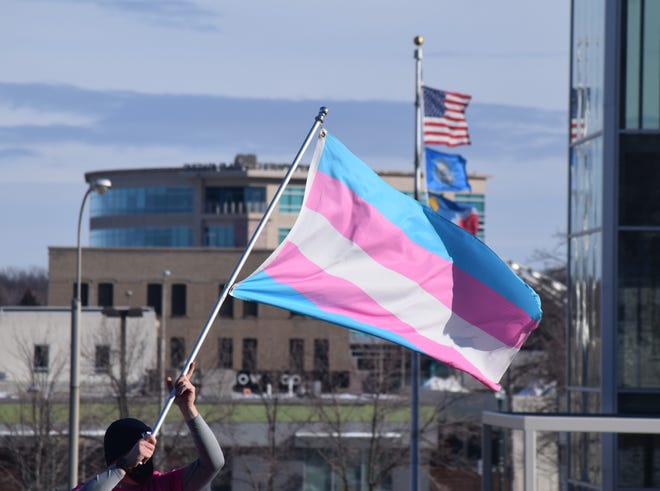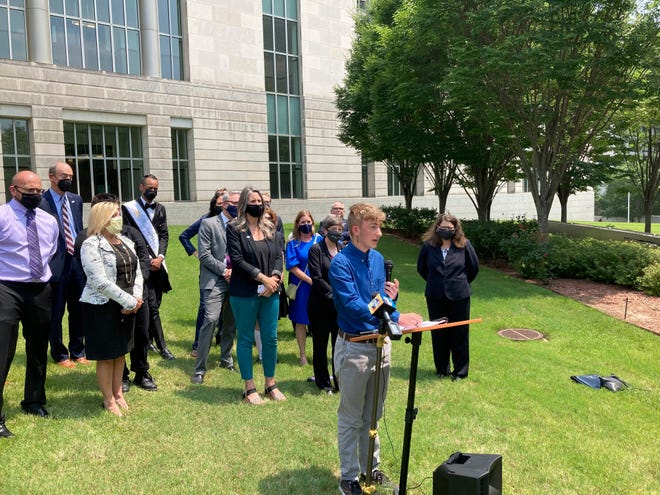
- Most of the 300-plus bills proposed in 2022 targeting LGBTQ rights are aimed at transgender people, largely youth.
- As 2022 midterm elections approach, some parents worried about legislative attacks on their transgender kids are fleeing home states.
- Relocating to trans-friendly states can mean losing jobs, family ties and childcare — and bring a higher cost of living.
For former Dallas writer and teacher Violet Augustine, the alarm bells first went off in October 2021, when Texas Gov. Greg Abbott signed a bill banning trans kids from playing on sports teams aligned with their gender identity.
Suddenly, the notion dawned on Augustine, whose 6-year-old trans daughter, Isa, is a skilled swimmer, that she might have to leave her native state. Probably within a decade, she figured. But when Dallas’ Children’s Medical Center announced a month later that it was shutting down its acclaimed youth gender-affirming care program, her time estimate shrank by half.
Then, in February, Abbott issued an order directing the state’s child-welfare agency to investigate providers of gender-affirming care for youth.
Suddenly, Augustine’s timeline became immediate. Isa’s school community had been, if not supportive, at least tolerant of her identity. She wondered: Are they going to report us now?
In June, Augustine, 37, decided to flee Texas for California, using the money she’d been saving to buy a home to fund their relocation.
As the 2022 midterms approach, an onslaught of legislation and rhetoric targeting transgender youth in recent years has prompted parents of transgender kids to ponder similar choices. Advocates say some have uprooted lives in states like Texas, Arizona, Alabama and Arkansas to find refuge in states they feel offer safer climates.
More than 300 anti-LGBTQ bills have been introduced in 2022, according to Human Rights Campaign, an advocacy organization based in Washington, D.C. Most aim to restrict the rights of trans people, largely trans youths’ abilities to participate in sports or receive gender-affirming care.
“This is a crisis,” said Kim Shappley, another former Texas resident parent who left the state with her transgender child this summer. “We have political refugees in the U.S., leaving with whatever they can fit in their car.”

Such decisions can be critical: A nationwide survey of nearly 35,000 LGBTQ people in 2021 found that more than half of transgender and nonbinary youth had considered suicide in the previous year, and advocates say affirmation of gender identity is an important factor in youth mental health.
Meanwhile, 85% of trans and binary youth reported that ongoing debates about state laws restricting transgender rights had negatively affected their mental health.
“Now we’re seeing state departments weaponized,” said Ricardo Martinez, CEO of LGBTQ advocacy agency Equality Texas. “That has really cemented this culture of fear for parents who are just incredibly worried about their kids. They’re worried about dropping them off at school, fearing that phone call that their kid has been pulled out of class and that they’re being reported.”
While the number of transgender families able or willing to leave their home states is thought to be comparatively low compared to those who stay, advocates say it’s tragic that parents are pushed to consider the possibility.
“Why is it OK that they have to leave?” said Andrea Segovia, senior field and policy advisor for Transgender Education Network of Texas. “They’re terrified that their kid is going to commit suicide, or that if their kid has COVID and they go to a hospital for care that they might get reported.”
Opponents of gender-affirming care for youth — which includes hormone treatments, puberty blockers and behavioral approaches designed to support a child’s identity — say kids are too young to make potentially life-altering decisions about their gender identity.
Advocates say opponents are placing ideology over science, noting that surgery is rarely conducted for trans individuals under 18 and that withholding affirming care prevents doctors from providing best-practice treatment and puts transgender youth at risk by placing their emotional and physical well-being in jeopardy.
Bills denying such care have been opposed by the American Academy of Pediatrics and the American Psychiatric Association.
Allison Scott, director of impact and innovation for Campaign for Southern Equality, an advocacy agency supporting LGBTQ Southerners, said many families in states where such laws are passing or gaining steam choose to law low, unable to afford or manage a move or unwilling to break community ties.
“They’re just trying to survive and stay where they are,” Scott said. “That’s why we need protections at the federal level. People’s rights should not change with their zip code or the state they live in.”

Others, like Augustine, are desperate enough to leave that they tap funding sources like GoFundMe to help finance relocation, ditching previous life plans or sacrificing financial gain to escape as fast as possible.
“For a lot of families who move, it wasn’t like they had that window of time to test the market and sell their house,” Segovia said. “A lot of families do depend on the generosity of others. But I also know of families who had to split up, where one parent took their kid to a family’s house in whatever place while the other parent had to stay and maintain their job. People are having to make hard choices in a quick amount of time.”
‘I thought the devil was trying to steal my kid’
At first, Augustine didn’t take seriously her toddler’s declarations of being a girl; but two years later, in late 2020, when Isa hadn’t changed and became distraught over her anatomy, Augustine researched the issue and figured maybe Isa was right.
“When I affirmed her and said, ‘You’re a girl, yeah,’ the tension just melted from her body,” said Augustine, who separated from Isa’s father in 2019. “She just lit up. It was almost like I’d never actually seen her smile until that day.”
An estimated 29,800 youth aged 13 to 17 identify as transgender in Texas, the country’s third highest such population behind California and New York, according to data compiled by the Williams Institute at the University of California, Los Angeles’ School of Law. Nationally, about 300,000 youth of that age group identify as transgender.
Augustine let Isa, who had just turned five, dress the way she wanted, knowing there would be backlash from her mostly conservative family. Exposed to inflammatory rhetoric, they feared for her safety.
Then, when Isa’s daycare facility dismissed her, saying she would be a distraction, “that was our first introduction to what it would be like to be trans in Texas,” Augustine said.
The experience was similar for Shappley, a single mom raised in a conservative family in rural Mississippi who ministered at a Houston megachurch when her child, Kai, told Shappley she was a girl.
Kai’s femininity had been evident as a toddler, Shappley said; she preferred girls’ toys and pulled T-shirts around her waist like skirts, asking to grow her hair long.
“I thought the devil was trying to steal my kid,” Shappley said.

She tried to “fix” Kai, reading and talking to church leaders. Pursuing a nursing degree, she looked to her program for answers, learning that LGBTQ kids were more prone to depression, homelessness and human trafficking. What she learned about gender identity in psychology class mirrored her experience with Kai.
One day, despairing, she called her psychiatrist to vent. She’d stepped outside so the kids wouldn’t hear and was pacing her driveway when the doctor posed a question that changed everything.
“She said, ‘If you were on a desert island, just you and Kai, and she wanted to wear girls’ clothes, are you going to let her?’ I said, ‘Yeah.’ And she said, ‘You know, your problem isn’t your God. Your problem is how you think other people are going to see you.’”
That was when Shappley decided it wasn’t Kai’s transition she needed to worry about. It was her own.
“Before Kai, I thought it was a choice,” Shappley said. “As Christians, you know, I thought you just showed them love so that you could change them and prevent them from going to hell. What I know now is that’s just manipulation and incredibly harmful.”
Acceptance came with its own problems. Kai, in girls’ clothes, was booted from daycares after other parents complained. Family members and once-close friends have fallen away – people whose weddings Shappley had performed or supported in hospital delivery rooms.
In suburban Houston, school administrators ignored Kai’s identity. Shappley, advocating on her behalf, faced harassment at school board meetings – and then, as she became more visible, in store parking lots.
Eventually, she felt forced to move her family to Austin, feeling secure enough there that she and Kai both testified before the Texas Legislature against proposed anti-trans legislation. Still, it was becoming clear to her, she said, that targeting trans kids was shaping up to be a GOP strategy.
Then came Abbott’s directive. Having just reestablished her financial footing after leaving Houston, Shappley felt forced to consider moving again.
Moving to a new state
Some aren’t as fortunate. Anya Phenix, a North Texas mom whose 17-year-old child, Levi, came out as transgender after his father died in 2017, has had little luck scraping together the necessary resources to leave the state.
Phenix, 48, has been going by that name since 2012 when she left her church “because of the hate I was seeing” over LGBTQ identity issues and wanted a way to write about the subject without further straining her family relationships.
For her, everything hinges on next month’s gubernatorial contest. While a district judge has since granted temporary protection from Abbott’s order to member families of PFLAG under a lawsuit filed by Lambda Legal and Texas’ American Civil Liberties Union, she and Levi are using their new chosen names to avoid potential prosecution.
“I’m hoping Beto (O’Rourke, Texas’ Democratic candidate) wins, but if he doesn’t, we’ll have to get out as fast as we can because it looks like things will spiral fast,” Phenix said. “We’ve been looking at Colorado, but the laws are changing everywhere, so we’re up in the air as far as where we’ll end up.”

Phenix had hoped to leave the state as soon as her lease ends in December, but for a single parent supporting a child and his disabled best friend, the situation isn’t promising. She works as a barista in the Dallas-Fort Worth area, struggling to find more substantial employment after not working for 10 years while she homeschooled Levi.
Her husband, who’d driven a rented car for a ride-sharing service, died three days after suffering a stroke. The vehicle was reclaimed by the company, leaving Phenix without transportation; her survivor benefits, about $1,500 a month, expire in June.
She launched a GoFundMe page in hopes of getting a car, which she says she’ll need not only for work but to relocate wherever she decides to go.
“All our friends are here,” Phenix said. “We really don’t want to have to leave… I have moments of fear every day. We’re wondering what’s going to happen to us, whether we’re going to have enough money to support our needs – and how we’re going to stay safe.”
Moving can disrupt employment status, childcare arrangements and community bonds.
“You’re losing your work and your family, and a lot of people depend on family and friends for childcare,” said Scott, of the Campaign for Southern Equality. “Then you have the economy – a lot of people are struggling with housing and don’t have the resources to pick up and move. You can’t just give people $5,000 or even $10,000 and expect that to fix their problems.”
Last year, less than 40% of Americans said they could handle an unexpected $1,000 expense, even after federal stimulus funding pumped trillions of dollars into the economy, according to Bankrate.com.
The places parents and advocates cite as friendlier environments for trans kids tend to be more expensive than those that families seek to leave.
“We don’t have that many states to move to,” said Shappley, who in July left Texas for Connecticut with Kai, Kai’s 9-year-old brother, Kaleb, and their dog and three cats. The trip took two and a half days, camping at roadside parks for a few hours along the way because hotels wouldn’t take all their animals.
Her electric bill has since tripled, and her rent is double what it was in Austin. “We’ve been doing this since Kai was 5 years old, so I’m just ready to exhale.”
At age 11, Kai is an activist in her own right, nominated as Time magazine’s 2021 “Kid of the Year” and featured along with her mother in several magazine articles and a documentary.
Shappley sees similarities in the tactics employed against trans kids and those used a half-century ago in the wake of Roe v. Wade – the harassment and bomb threats against clinics providing abortion services then and those offering gender-affirming care now. And while many of those threats prove to be just that, the chilling effect is the same: Clinics shutting down and clients staying away out of fear.
“This is not going to go away,” she said.
Scott said even proposed legislation can prompt clinics and programs to shut down for fear of legal repercussions. Some, she said, never reopen if such bills fail because program staff have left for friendlier climates in the meantime, “and these legislators are smart enough to know that.”
After Abbott’s order sent many parents of trans kids into hiding, representatives of Equality Texas attended a child welfare services department hearing and read the stories and statements of those afraid to make their own case. Afterward, CEO Martinez said, a department trustee approached them, saying only 13 families had been investigated and that the advocates were wasting their time.
“This doesn’t impact only 13 families,” he said. “This has a chilling effect on how people can live their lives.”

For families able to leave, there are mixed feelings – the relief of leaving a hostile situation, sadness over leaving loved ones and losing one’s way of life, guilt over not staying to fight for families in similar situations.
Augustine decided on the Los Angeles area, aware of an LGBTQ children’s organization there she thought would be affirming for Isa, who’ll turn seven next month.
“I knew that we’d have chosen family to hang out with,” she said.
At first, Augustine was relieved to have left Texas, but as she processed her plight, her feelings became more complicated. In Dallas, she’d had a two-bedroom house with a yard; in California, they live in a one-bedroom apartment, with no backyard for Isa to play in.
“The states that are safe for her are more expensive than Texas, so that was a reality I couldn’t escape,” she said. “But as long as the laws here continue to be supportive, we’ll stay and I’ll hustle and make it work financially.”
The situation has also affected Augustine’s job prospects. Getting by as a writer and podcaster, she recently declined a college teaching opportunity in Milwaukee, she said, unconvinced that Wisconsin’s climate for transgender kids was much better than in Texas.
While Isa, being so young, has responded with resilience, Augustine said she longs for the sleepovers she used to enjoy with Augustine’s mother.
“The hardest part is that Isa misses her family,” Augustine said. “She tells me that every day, and it breaks my heart. It’s hard on me too. I used to have a lot of help, and now I don’t. I’m just keeping my head above water and doing what I have to do.”






